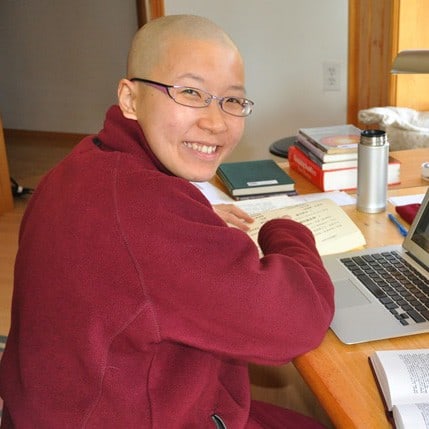Managing anger in a relationship

- A key human emotion in any relationship is anger. In Buddhism there are two other words that are related to anger—hatred and ill-will. Are they similar from the perspective of Buddhist psychology?Anger, hatred and ill-will are similar in that they’re all based on exaggerating the negative aspect of a person or situation or projecting negativity that isn’t there on a person or situation. Based on anger or hatred, ill-will goes further and makes plans to harm others. We’re angry, jealous, or spiteful and want others to “have a taste of their own medicine” so that they will know how we feel. However, harming them generally pushes them further away, and instead of regretting how they have treated us, they become angrier and the conflict escalates.
- As anger is so much a part of our human emotions, is it possible to express a bit of anger that is not hurtful?To answer this, let’s look at our own experience when someone else expresses a little bit of anger to us. What is our emotional response? We generally feel hurt, don’t we? How do we act when we feel hurt? Usually we either attack the other person, or we disengage and refuse to talk to him or her. In the same way, this is the way others feel and respond when we express a bit of anger towards them.
Does our angry behavior bring about the results we want? Usually not. When we’re hurt and angry—especially with a family member or someone else we care about—what we really want is to be close to them. This is true, isn’t it? If we didn’t care about them and want to be close to them, we wouldn’t get so upset.
But our anger propels us to act in ways that bring about the opposite of what we want. For this reason, and also because anger is based on exaggeration and projection, it’s to our advantage to subdue our anger.
- What is the first step we should take to prevent anger from arising in us?First, we must recognize our anger and acknowledge that we have it. Blaming our anger on others—saying, “You made me mad!”—is not accurate. Our anger comes from the seed of anger inside of us; it comes from our self-centeredness that filters everything through the lens of “me, I, my and mine.” The other person is only the external condition. We’ve got to own our anger and take responsibility for it, instead of blaming others. Only then will we be able to work effectively to subdue it.
After we recognize that we’re angry, instead of criticizing ourselves for being angry and releasing our anger on others, we need to reflect on the disadvantages of anger. Of course, this is more effective to do when we’re not angry! By reviewing our lives and seeing the adverse effect of anger on our relationships and our internal sense of wellbeing, we’ll want to learn the antidotes to anger.
One good source where you will find many antidotes to anger is Shantideva’s A Guide to the Bodhisattva’s Way of Life, chapter 6. H.H. the Dalai Lama’s book Healing Anger and my book Working with Anger are both modeled on this. In the Pali tradition, Buddhaghosa’s Path to Purification and Dhammapala’s A Treatise on the Paramis are good resources as well.
Reading these books or hearing teachings is a good start, but alone they won’t eliminate our anger. We have to put the teachings they give into practice. Doing that takes time and joyous effort, but it pays off.
- Divorce happens when two people in a marriage attack each other and say the nastiest words over the smallest things because they’re being driven by their feelings of anger. What is the best way to prevent such a situation from arising in the first place?In our modern society, people have a lot of myths about romantic love and marriage. In the rush of “falling in love,” they expect that feeling to last forever and neglect to see the other person as a whole human being who has faults as well as good qualities. Or if they see the other person’s faults, they think, “They will change because they love me,” or “Our love is so pure that I will help them get over this problem.”
This way of thinking prevents us from seeing the reality of intimate relationships—they require work. Both people need to work together and learn to communicate wisely and kindly. When each partner is willing to do this, the couple will grow closer and more accepting of each other as time goes on. Releasing their false expectations, they will learn to genuinely wish the other person to be happy and free of suffering.
To improve our ability to communicate, I recommend Marshall Rosenberg’s nonviolent communication. In books and DVDs of his seminars, he explains how to recognize and compassionately express our feelings and needs, and how to make requests—not demands—to other people. Like the Dharma, he tells us that instead of focusing on what the other person is doing and trying to get them to change and do what we want them to do, to look at what is going on inside of ourselves. Instead of judging others’ actions, he helps us learn to empathize with their feelings and needs.
- When anger has arisen in one partner, how should the other partner react so as not to further aggravate the situation?Rosenberg discusses four possible ways of responding to another person’s anger—the first two aggravate the situation, the last two help us communicate well.
- Blame the other person: “You’re totally untrustworthy! You’re always picking at me! Shut up and leave me alone!”
- Blame ourselves: “I’m such a failure, no wonder my partner is treating me this way. All the problems in the marriage are due to my inability to open up and love.”
- Give empathy to the other person: “Are you angry because you need understanding and acceptance? Are you upset because you need appreciation/ fairness / safety, etc.?”
- Give empathy to ourselves: “I feel scared and insecure when my partner is angry. I take refuge in the Three Jewels and feel supported by the Buddha’s compassion. I, too, can face this situation with kindness and compassion.”
- How can one engage with the other partner in a relationship if he/she refuses to make the effort to curb the anger from arising but allows it to run uncontrolled?Instead of describing the situation as “He/she refuses to make the effort to curb his/her anger,” describe it as, “He/she lacks the tools to see the disadvantages of anger and to manage his/her anger.” In other words, instead of seeing the situation as the other person’s fault, see it as something they are not yet skilled in doing. That will give you and them the mental space to relax in the situation.
It’s also worthwhile to examine the dynamics between the two of you. Are there things that you do that particularly annoy the other person or flame the fire of their anger? If so, you may want to look at your actions in more depth and see if there are other ways you could act or respond that would be less irritating or frustrating for the other person.
Another suggestion is to remember that the other person’s suffering lies behind their anger and offer them understanding and compassion. In that way, see that their anger has little to do with you and so don’t take what they’re saying personally. See it as an expression of their internal pain and confusion. Or you could suggest that the two of you together or separately seek help in working with your differences.
- Shantideva said patience is a great virtue but how long can one maintain a relationship if the other partner is always angry and verbally abusive?Patience doesn’t mean being a doormat. It doesn’t mean we allow or even enable a person to be verbally or physically abusive. Patience means that we are able to remain calm and clear in confronting harm and suffering. With that calm, clear mind we can then reflect on various courses of action and decide on the one that seems best. Patience can lead to being active and assertive; don’t confuse patience with passivity. They are very different. If someone is being physically or verbally abusive to you, for their benefit and your own, tell them that behavior is inappropriate and leave the situation.
- It is also possible that the other party in a relationship will regard this patience or non-retaliation as acknowledgement of faults, and hence will further continue with more verbal or even physical abuse as a result of the anger. How should one react when this happens?That happens when we are afraid and therefore are passive. It doesn’t happen when we have a sense of our own dignity and self-worth.
- How can one develop the right wisdom through Buddhism to know the right time to break off a relationship because of the uncontrollable anger from the other partner?If we or our children or parents are in physical danger, it’s time to leave. If we are unable to handle the verbal abuse and lose our self-confidence and sense of self-worth, it’s time to separate from the person and work on rebalancing yourself emotionally and spiritually. If allowing the other person to continue to vent their anger damages them and makes them spiral downwards, it’s time to separate from the person. We can separate with firmness and compassion, doing what we need to heal and praying that the other person will seek out the help they need to heal. Try to do this with compassion for yourself and other person and without blaming yourself or the other person. Avoid creating a hard and fast negative image of the other person and reacting to them as if they were 100% evil or untrustworthy. They still have good qualities. They are hurting as much as you are.
When divorce occurs and children are involved, the parents still need to learn to cooperate for the sake of the children. That means not speaking badly of the ex-spouse in front of the children, and not using access to the children as a means to retaliate or to get what you want from the ex-spouse. It means respectfully coordinating with each other who will be with the children when, and how to raise the children.
Venerable Thubten Chodron
Venerable Chodron emphasizes the practical application of Buddha’s teachings in our daily lives and is especially skilled at explaining them in ways easily understood and practiced by Westerners. She is well known for her warm, humorous, and lucid teachings. She was ordained as a Buddhist nun in 1977 by Kyabje Ling Rinpoche in Dharamsala, India, and in 1986 she received bhikshuni (full) ordination in Taiwan. Read her full bio.


